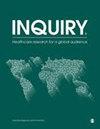在 COVID-19 大流行期间,居住在危房中的妇女获得医疗保健的机会减少了:定性研究
IF 1.7
4区 医学
Q3 HEALTH CARE SCIENCES & SERVICES
Inquiry-The Journal of Health Care Organization Provision and Financing
Pub Date : 2024-04-11
DOI:10.1177/00469580241246478
引用次数: 0
摘要
本研究旨在采用基础理论方法,深入了解在 COVID-19 大流行期间,窘迫住房妇女在健康和获得医疗服务方面的经历。本研究通过对土耳其伊兹密尔的 17 名危房妇女进行访谈,获得了定性数据。大多数参与者的健康状况不佳主要归因于不利的生活条件和社区网络的削弱。由于在获取基本需求方面存在障碍,COVID-19 大流行加剧了现有的健康问题。在大流行病期间,粮食无保障的情况十分普遍,与会者强调了援助的关键作用以及社会援助在确保粮食供应方面的不足。妇女的健康观念在很大程度上受到性别的影响,性别照料责任限制了妇女获得医疗保健的机会。获得医疗保健的机会也受到经济困难的限制,医疗保险是一个重要的决定因素。较长的等待时间(往往因预约制度而加剧)和语言是获得医疗服务的重大障碍。研究结果表明,由于 COVID-19 测量方法对脆弱性视而不见,导致参与者在住房、食品、就业和获得医疗服务方面存在更深层次的不平等。这项研究探讨了住房岌岌可危妇女健康的政治、商业和社会决定因素。要改善住房岌岌可危的妇女的健康和福祉,就必须实施以提高住房质量为目标的公共政策,针对粮食不安全问题提供有针对性的援助,促进性别包容,并推动性别赋权。本文章由计算机程序翻译,如有差异,请以英文原文为准。
Healthcare Access Worsened for Women in Precarious Housing During the COVID-19 Pandemic: A Qualitative Study
This research aims to gain an in-depth understanding of precariously housed women’s experiences related to health and access to health care during the COVID-19 pandemic using a grounded theory approach. Qualitative data were obtained through interviews with 17 precariously housed women from Izmir, Turkey. Poor health among most participants was primarily attributed to unfavorable living conditions and weakened community networks. The COVID-19 pandemic exacerbated existing health issues due to barriers in accessing basic needs. Food insecurity was widespread during the pandemic and the critical role of aid and the inadequacy of social assistance in securing food were emphasized. Women’s health perceptions were significantly shaped by gender, and gendered caregiving duties have restricted women’s healthcare access. Access to healthcare was also limited by financial challenges, with health insurance being a crucial determinant. Longer waiting times, often exacerbated by the appointment system, and language were significant barriers to healthcare access. The findings propose that the participants were precarized by the blindness of COVID-19 measures to vulnerabilities, which resulted in deeper inequalities in housing, food, employment, and healthcare access. This research addresses the political, commercial, and social determinants of precariously housed women’s health. Improving precariously housed women’s health and wellbeing requires implementation of public policies targeting to improve housing quality, provide targeted assistance to food insecurity, promote gender inclusiveness, and foster gender empowerment.
求助全文
通过发布文献求助,成功后即可免费获取论文全文。
去求助
来源期刊
CiteScore
2.50
自引率
0.00%
发文量
192
审稿时长
>12 weeks
期刊介绍:
INQUIRY is a peer-reviewed open access journal whose msision is to to improve health by sharing research spanning health care, including public health, health services, and health policy.

 求助内容:
求助内容: 应助结果提醒方式:
应助结果提醒方式:


